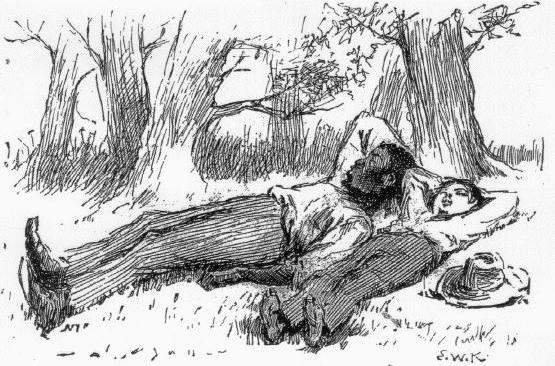 Yesterday I mentioned that Huckleberry Finn has been banned in some schools, perhaps because of Huck’s liberal use of the “n” word. Now Twain, of course, doesn’t use that language because he himself is racist but because he wants to capture Huck’s “white trash” ignorance, which Huck then magnificently transcends. But the argument has gone (or did in a Washington, D.C. school in the early 1990’s) that teenagers will not understand that Twain is being ironic and therefore will only have their racist stereotypes reinforced by his language. In other words, the book could do damage to young readers.
Yesterday I mentioned that Huckleberry Finn has been banned in some schools, perhaps because of Huck’s liberal use of the “n” word. Now Twain, of course, doesn’t use that language because he himself is racist but because he wants to capture Huck’s “white trash” ignorance, which Huck then magnificently transcends. But the argument has gone (or did in a Washington, D.C. school in the early 1990’s) that teenagers will not understand that Twain is being ironic and therefore will only have their racist stereotypes reinforced by his language. In other words, the book could do damage to young readers.
I was particularly aware of this controversy because my 17-year-old son Justin read the accounts of the attacks on the book, which appeared in The Washington Post, and took them as a personal affront and as a challenge. The affront: that as a teenager, he was incapable of grasping Twain’s irony. The challenge: to show, in an essay for his English class, that he in fact understood the irony. And he did, writing an essay in which he distinguished between Huck’s voice and Twain’s.
But okay, I know this doesn’t put the argument to rest. Justin, after all, was an English professor’s kid, one who had been raised to read and think about books. So I think the question is still out there, whether a great book like Huckleberry Finn can do harm in certain situations. Perhaps not at the time it first appeared, when it was in fact progressive in the way it showed Jim to be human and deserving of care. But now when the landscape has changed.
My favorite critic, Wayne Booth of the University of Chicago, takes up the case of Huckleberry Finn in his wonderful book The Company We Keep: An Ethics of Criticism. Booth tells the powerful story of how, in the 1960’s, Paul Moses, an African American colleague of his (I think his only African American colleague) voiced problems with the book. Moses said that he was not so much disturbed by the use of the “n” word as by the fact that Jim wasn’t angrier at the way he was treated, including at the way he becomes a toy in the hands of Tom Sawyer at the end of the book. Instead, Jim seems to be eternally docile and forgiving. Essentially Moses thought that Twain had created a white person’s ideal of what a black man should be like, and he was frustrated that none of his colleagues could see this.
I don’t believe that Booth reports Moses taking up the question at the center of his own book, whether Huckleberry Finn could have a damaging impact upon readers. But one could imagine Moses making the argument that Huckleberry Finn could help undermine the self-esteem of young African Americans. He may have thought that it was also doing damage to his white colleagues: in their respect for the book, perhaps they expected him to be a modern version of Jim (we’re talking about the mid-1960’s here).
One of Booth’s best qualities is that he is a compassionate man and a great listener. And although at the time he thought that Moses was wrong, over the years he worked at trying to see the book through his eyes. As he did so, he began to see the problems that Moses had seen and found himself looking at a very different book than he had first encountered. In fact, Huckleberry Finn fell a bit in his esteem when he realized that it did have racist elements. Booth was so grateful to Moses for having opened him to new perspectives that, although Moses died not long after the incident, Booth dedicated The Company We Keep to him when he published it years later.
But although Booth’s reading of Huckleberry Finn had become more complicated, he did not back away from the idea that it was a great work. In fact, he says that, even as a child, he sensed that there was something wrong with how Tom was treating Jim as his personal toy in a Walter Scott or Alexander Dumas adventure story. This was the case, Booth says, even though Twain doesn’t say so explicitly and even though Twain seems to be playing the scene for laughs. Whatever Twain’s intentions and whatever prejudices he shared with his time (and prejudiced he was, even though he was more enlightened on the question of race than most of his white contemporaries), Booth argues that something about his novel’s depiction of Jim calls into question the actions of self-indulgent whites—and did so even for a child reader. Booth in essence says that the book is bigger than the author on this score.
This doesn’t make the original question I raised go away, however. Can the book do some readers, say high school students who are assigned it as juniors and who have not been trained in the reading of irony by their English professor fathers. It is a vexed question which I will take up in tomorrow’s entry.


One Trackback
[…] written in the past why I don’t think the book should be banned (here and here) and why I don’t believe that Twain was a racist. So I agree with what these people, […]